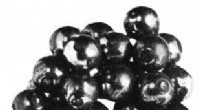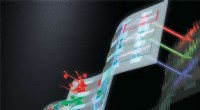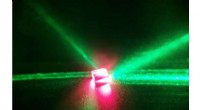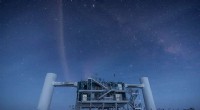Hvordan NQISRC'erne udnytter kvanterevolutionen

Kredit:CC0 Public Domain
Mens de har deres egne unikke områder af ekspertise og ressourcer, er NQISRC'erne alle tilpasset den samme mission - fremme af kvanteinformationsvidenskab.
Fem nationale kvanteinformationsvidenskabelige forskningscentre (NQISRC'er) udnytter naturens adfærd i de mindste skalaer til at udvikle teknologier til videnskabens mest komplekse problemer. Støttet af US Department of Energy (DOE) Office of Science, har NQISRC'erne støttet DOE's mission siden 2020 for at fremme den energimæssige, økonomiske og nationale sikkerhed i USA. Ved at opbygge et nationalt kvanteøkosystem og arbejdsstyrke, der omfatter forskere ved omkring 70 institutioner i hele USA, skaber centrene et rigt miljø for kvanteinnovation og co-design.
NQISRC'erne integrerer state-of-the-art DOE-faciliteter, fremtrædende talent ved nationale laboratorier og amerikanske universiteter og amerikanske teknologivirksomheders foretagsomme opfindsomhed.
Som et resultat skubber centrene grænsen for, hvad der er muligt inden for kvantecomputere, sensorer, enheder, materialer og meget mere.
Hvert nationalt center ledes af et DOE nationalt laboratorium:
- Co-design Center for Quantum Advantage (C 2 QA), ledet af Brookhaven National Laboratory
- Q-NEXT, ledet af Argonne National Laboratory
- Quantum Science Center (QSC), ledet af Oak Ridge National Laboratory
- Quantum Systems Accelerator (QSA), ledet af Lawrence Berkeley National Laboratory
- Superconducting Quantum Materials and Systems Center (SQMS), ledet af Fermi National Accelerator Laboratory
Før med videnskab
"Hvert center er en formidabel kraft for kvanteinformationsvidenskab i sig selv, og skubber grænserne for databehandling, fysik, kemi og materialevidenskab for at bringe transformerende nye teknologier til nationen," sagde Q-NEXT-direktør David Awschalom. "Men sammen er de et nationalt kraftcenter, der løfter kvantevidenskab og teknik til særlig fremtræden i USA og positionerer landet til at være en global leder på området."
Kvanteinformationsvidenskab (QIS) er et hastigt voksende forskningsfelt, der undersøger naturens kvanteegenskaber for at opbygge nye, kraftfulde måder at behandle information på på så forskellige områder som medicin, energi og finans. Ved at manipulere materiens mest fundamentale egenskaber kunne forskere opfinde nye sensorer med hidtil uset præcision, kraftfulde computere og sikre kommunikationsnetværk.
Til det formål arbejder centrene på at prototype og evaluere ydeevnen og virkningen af kvantecomputere og sensorer bygget ved hjælp af forskellige teknologiske platforme og arkitekturer.
"Der er mange valg og muligheder, der skal træffes i udviklingen af kvantecomputere, og forståelsen af, hvordan nuværende enheder fejler, afslører vejen frem for os," sagde C 2 QA-direktør Andrew Houck. "NQISRC'erne kan tackle denne overraskende svære opgave, fordi de nuværende kvantecomputere på trods af store fremskridt på området stadig er for støjende og tilbøjelige til fejl til brugbare beregninger."
At forstå materialers kvanteadfærd er afgørende for at overvinde disse støjbegrænsninger og for realiseringen af enheder, der vil tilbyde en kvantefordel. De nationale laboratorier er unikt positioneret til at tilbyde avancerede faciliteter og viden, der guider forståelsen og overvindelsen af disse begrænsninger.
"DOE har i årevis investeret i banebrydende teknologier, værktøjer og faciliteter på nationale laboratorier, som tilbyder unikke muligheder for at muliggøre et spring i ydeevnen for kvanteenheder," sagde SQMS-direktør Anna Grasselino. "Vi er glade for at tilbyde verdensførende ekspertise til at gøre transformerende fremskridt inden for QIS, især fordi QIS kan hjælpe med at fremme vores mission om at forstå verden på dets mest grundlæggende niveau."
Samarbejde om kvanteinnovation
The interdisciplinary teams at the NQISRCs co-design quantum technologies to set the stage for future scientific discoveries. Advances in QIS will bring about societywide benefits, such as new materials and powerful quantum sensors that, when combined with medical imagers, could measure tissue at the individual-cell level, bringing far greater sensitivity to today's magnetic resonance imaging machines.
By understanding what enables and limits different quantum technologies and what tools need to be developed, the co-design effort across the NQISRCs could translate into faster drug and vaccine development, novel materials, improvements in transportation and logistics, and more secure financial networks.
As a national ecosystem, NQISRC researchers leverage world-class DOE Office of Science user facilities and programs, such as the Advanced Photon Source at Argonne National Laboratory, the Oak Ridge Leadership Computing Facility at Oak Ridge National Laboratory, the Advanced Light Source at Lawrence Berkeley National Laboratory, the National Synchrotron Light Source II at Brookhaven National Laboratory, and the superconducting technology facilities and technologies at Fermilab.
"Through the funding of these strategic quantum centers, DOE has given researchers an incredible opportunity to make impactful and world-changing discoveries in QIS," said QSC Director Travis Humble. "Based on the first two years of operation, there is every reason to believe these centers will make tremendous progress in the coming years in advancing QIS toward real-world innovation. We will see an increasing flow of discovery science through the innovation chain."
Similarly, laboratory and university scientists can leverage the market-driven technologies developed by their industry partners, such as test beds and simulation tools. Capitalizing on these networks, each center builds a pathway to commercializing quantum technologies and, eventually, bringing them to the public.
Preparing the quantum workforce and engaging with industry
The lasting impact of the NQISRCs' co-design efforts for science and technology will depend on a quantum workforce to carry it into the future. All national centers are committed to building a workforce with a focus on diversity, equity and inclusion through institutional degree programs, cooperative training programs with industry and retraining certificate programs. This sets the stage for many more innovations and fundamental science questions to be explored.
"The centers have taken a multipronged approach to train the next generation of QIS scientists and researchers and to create new pipelines for underrepresented groups," expressed QSA Director Irfan Siddiqi. "We're all putting forth special efforts to support a diverse quantum workforce in a fast-growing field."
The QSC at Oak Ridge National Laboratory, for example, held its second annual quantum summer school in May, a forum for sharing QIS topics with high schoolers, college students, postdocs and professionals. The event included panels on workforce development strategies with leading industry representatives as well as networking opportunities for students and staff.
C 2 QA recently held its second six-weeklong quantum computing summer school, QIS101, for undergraduate students this year, with a focus on building fundamental and practical skills and growing a diverse quantum workforce. 40% of the participants in C 2 QA's summer session were women, and nearly 44% were from communities underrepresented in QIS.
Q-NEXT partners with other quantum institutions to build a more diverse and inclusive quantum workforce through the Open Quantum Initiative, a group led by the Chicago Quantum Exchange. One key effort was the creation of an undergraduate fellowship program for underrepresented, racially minoritized quantum scientists. This summer, the fellowship participants worked side-by-side with scientists at collaborating institutions on challenging projects in QIS.
QSA works closely with several regional and international companies with strong records in diversity and inclusion programs. Furthermore, it is partnering with local economic development boards already active in the industry to establish internship and apprenticeship programs and accelerate startups. QSA hosted in 2021 its industry and investor roundtable events, attended by dozens of founders, investors, CEOs, senior scientists and engineers from across the United States and worldwide.
SQMS has announced the recipient of the first Carolyn B. Parker Fellowship, named for Carolyn Beatrice Parker, who was the first African American woman to earn a Ph.D. in physics. The center is currently recruiting for a second Parker fellow and is wrapping up the second annual undergraduate internship program as well as the SQMS QIS Summer School, co-hosted by the Galileo Galilei Institute in Florence, Italy.
On Sept. 14, Brookhaven National Laboratory will host the second NQISRC Virtual Quantum Career Fair. The event aims to make undergraduate, graduate and postdoc communities more aware of the DOE Office of Science's NQISRCs and the different types of careers in QIS at the centers—from technical to non-STEM careers. The first NQISRC career fair, held in fall 2021, attracted close to 400 participants, with 12% representation from minority-serving institutions.
Advances in quantum information science have the potential to revolutionize research and society. The NQISRCs are at the forefront of this emerging field by developing technologies that go beyond what's previously possible. + Udforsk yderligere
Importance of the science of measurement in the quantum revolution
 Varme artikler
Varme artikler
-
 Fysikere bruger en ny absorberende tilstandsmodel til at undersøge tilfældig tæt pakningEn tæt tilfældig pakning af stålkuglelejer, døbt Random Close Packing af Bernal i 1960. Kredit:Kredit:BERNAL, J., MURER, J. Pakning af sfærer:Koordinering af tilfældigt pakkede sfærer. Natur 188, 910-
Fysikere bruger en ny absorberende tilstandsmodel til at undersøge tilfældig tæt pakningEn tæt tilfældig pakning af stålkuglelejer, døbt Random Close Packing af Bernal i 1960. Kredit:Kredit:BERNAL, J., MURER, J. Pakning af sfærer:Koordinering af tilfældigt pakkede sfærer. Natur 188, 910- -
 Bane vejen til elektrisk pumpede lasere fra kolloidale kvantumpunkterKolloide kvantepunktdioder kan oprettes på laboratoriets bordplade og har stort potentiale i en lang række praktiske anvendelser. Forskere ved Los Alamos National Laboratory udvikler metoder til at ov
Bane vejen til elektrisk pumpede lasere fra kolloidale kvantumpunkterKolloide kvantepunktdioder kan oprettes på laboratoriets bordplade og har stort potentiale i en lang række praktiske anvendelser. Forskere ved Los Alamos National Laboratory udvikler metoder til at ov -
 Forskere bruger diamant i verdens første kontinuerlige rumtemperatur solid-state maserEn diamant, der indeholder nitrogen-ledige (NV) defekte centre, belyses af en 532 nm grøn laser. Det røde lys, fordi NV -centrene fluorescerer. Kredit:Jonathan Breeze, Imperial College London Mase
Forskere bruger diamant i verdens første kontinuerlige rumtemperatur solid-state maserEn diamant, der indeholder nitrogen-ledige (NV) defekte centre, belyses af en 532 nm grøn laser. Det røde lys, fordi NV -centrene fluorescerer. Kredit:Jonathan Breeze, Imperial College London Mase -
 Begivenheder med ultrahøj energi er nøglen til undersøgelse af spøgelsespartiklerFysikere i kunst og videnskab har foreslået en ny måde at udnytte data fra store neutrinoteleskoper som IceCube Neutrino Observatory i Antarktis. Kredit:Felipe Pedreros/IceCube og National Science Fou
Begivenheder med ultrahøj energi er nøglen til undersøgelse af spøgelsespartiklerFysikere i kunst og videnskab har foreslået en ny måde at udnytte data fra store neutrinoteleskoper som IceCube Neutrino Observatory i Antarktis. Kredit:Felipe Pedreros/IceCube og National Science Fou
- Kemiske jobsøgende står over for hårde udsigter under pandemien
- Hvordan man reducerer metan-emissioner fra olie- og gasindustrien i hele Nordamerika
- Hvad er nogle interessante eller unikke egenskaber ved Neptun?
- Hvad er Multiplikation?
- NASA fanger dannelsen af den femte atlantiske depression
- Biovenlige protoceller pumper blodkar op


